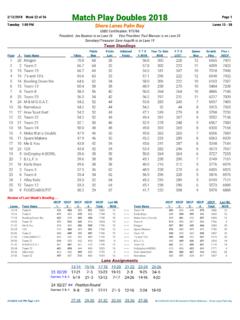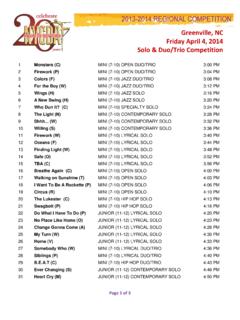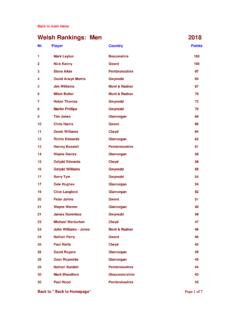Transcription of 158648463X-text.qxd 6/15/06 2:34 PM Page i
1 6/15/06 2: 34 pm page i The Best of I . F. S t o n e 6/15/06 2: 34 pm page ii A l s o B y I . F. S t o n e The Court Disposes (1937). Business as Usual (1941). Underground to Palestine (1946). This is Israel (1948). The Hidden History of the Korean War, 1950 1951 (1952, 1988). The Truman Era, 1945 1952 (1953, 1988). In a Time of Torment, 1961 1967 (1967). The Haunted Fifties (1969). Polemics and Prophecies, 1967 1970 (1970). The Killings at Kent State (1971). The Stone's Weekly Reader (1973). The Trial of Socrates (1988). The War Years, 1939 1945 (1988). 6/15/06 2: 34 pm page iii The Best of I . F. S t o n e I . F. S t o n e Edited by Karl Weber Introduction by Peter Osnos PublicAffairs New York 9/27/06 12:32 PM Page iv Copyright 2006 by the Estate of I. F. Stone. Copyright 2006 Introduction by Peter Osnos. Published in the United States by PublicAffairs , a member of the Perseus Books Group. All rights reserved. Printed in the United States of America. No part of this book may be reproduced in any manner whatsoever without written permission ex- cept in the case of brief quotations embodied in critical articles and reviews.
2 For information, ad- dress PublicAffairs, 250 West 57th Street, Suite 1321, New York, NY 10107. PublicAffairs books are available at special discounts for bulk purchases in the by corporations, institutions, and other organizations. For more information, please contact the Special Markets Department at the Perseus Books Group, 11 Cambridge Center, Cambridge, MA 02142, call (617) 252 5298, or email Book Design by Jeff Williams Library of Congress Cataloging-in-Publication Data Stone, I. F. (Isidor Feinstein), 1907 1989. The best of Stone / edited by Karl Weber ; introduction by Peter Osnos. 1st ed. p. cm. Previously published essays apprearing primarily in Stone's weekly reader; additional es- says published in the Nation and The New York review of books. Includes index. ISBN 13: 978 1 58648 463 7. ISBN 10: 1 58648 463-X. 1. United States Politics and government 1945 1989. 2. United States Foreign rela- tions 1945 1989. 3. World politics 1945 1989. 4. United States Race relations.
3 I. Weber, Karl. II. Stone, (Isidor F.), 1907- Stone's weekly reader. III. Title. 2006. '5 dc22. 2006050398. First Edition 10 9 8 7 6 5 4 3 2. 6/15/06 2: 34 pm page v Contents Introduction by Peter Osnos ix Editor's Note xv Prologue: A Word About Myself 1. 1. Worth the Risk Free Speech Is Worth the Risk 11. Quis Custodiet Custodem? 14. Einstein, Oxnam, and the Inquisition 17. The First Welts on Joe McCarthy 23. The Cost of Anticommunism 28. Incommensurate Equation: Justice and Security 30. Freedom of the Press: A Minority Opinion 35. The Court Turns Back the Clock 38. Boris Pasternak 42. In Defense of the Campus Rebels 45. The Crisis Coming for a Free Press 49. 2. A Good War But For What? War Comes to Washington 59. The Shake-up We Need 63. 6/15/06 2: 34 pm page vi VI Contents Washington's Forbidden Topic 67. One Year After Pearl Harbor 71. Relaxing Too Soon 75. How Washington Took the News 79. The Same Old Codgers 83. Brass Hats Undaunted 87. The End of the War 93. Organization for Peace.
4 Or Against the Soviet Union? 96. 3. Twilight Struggle Unnoticed News Bulletin 103. Mr. Smith Pleads for Peace 106. Shall We Take the Gamble Hitler Lost? 108. A Chill Falls on Washington 112. First Call for a Test Ban 115. National Suicide as a Form of Defense 118. Natasha's Ready Answers 123. The Legacy of Stalin 130. Almost as Safe as Ivory Soap Is Pure? 138. The Mythology of the Anti-Missile Missile 142. Fresh Light on the Mystery of the Missiles 147. The Rapid Deterioration in Our National Leadership 156. 4. The Wall Between Black and White The Voice of America Falters 163. May 17, 1954 166. The Murder of Emmett Till 168. Eisenhower Goes Neutralist On Civil Rights 171. 6/15/06 2: 34 pm page vii Contents VII. The Beginnings of a Revolution 174. The Wall Between 177. When the Bourbon Flowed 179. The March on Washington 188. The Fire Has Only Just Begun 191. The Mason-Dixon Line Moves to New York 195. 5. A Promised Land? For the Jews Life or Death? 205. Jewry in a Blind Alley 209.
5 Palestine Pilgrimage 213. The Racist Challenge in Israel 219. Holy War 225. 6. A War Made of Lies What Few Know About the Tonkin Bay Incidents 247. Lyndon Johnson Lets the Office Boy Declare War 256. Time to Tell the Truth for a Change 260. What It's Like to Be in Saigon 266. Why We Fail as Revolutionaries 276. While Others Dodge the Draft, Bobby Dodges the War 281. The Mindless Momentum of a Runaway Military Machine 284. Same Old Formulas, Same Tired Rhetoric 288. Only the Bums Can Save the Country Now 292. 7. Heroes and Others Thomas E. Dewey 303. Farewell to 309. 6/15/06 2: 34 pm page viii VIII Contents LaGuardia and UNRRA 313. Albert Einstein 317. Goldwater and His Tribe 319. Curtis LeMay: Cave Man in a Jet Bomber 326. Epilogue: For a Universal Day of Atonement 339. Index 341. 6/15/06 2: 34 pm page ix Introduction by Peter Osnos I n late summer 1965, as I. F. Stone scrambled to find a replacement for an assistant who had landed a job at The New Republic, he took me to lunch at a restaurant in Washington, 's small Chinatown.
6 We had, as I recall, fish with ginger, wrapped in paper and dipped in boiling water. I was twenty-one and working for the Providence Journal in one of their local bu- reaus. Stone offered me $100 per week and said I would earn every penny. I. stayed until the following summer, got a raise to $110 and an education in journalism (or what Izzy would have called being a newspaperman ) worth millions. This was a particularly good period, personally and professionally, for Stone and his four-page I. F. Stone's Weekly. After years of being so hard-of- hearing that he had to wear an elaborate headset with antenna, making him look like a bespectacled Martian, Izzy's ears had been repaired by a doctor (Cohen was his name) who had performed the same operation on Chairman Mao. Many people would still talk to him as though he was deaf, especially on the phone, so speaking and listening habits of years duration were being relearned. Even news gathering was different. Izzy was especially well known for poring through transcripts and finding nuggets other reporters would miss.
7 Now he could actually hear what was being said at events like press conferences. Izzy was naturally gregarious and excited to be part of any and all conversations. But he needed to also retain his relentless pursuit of news, ix 6/15/06 2: 34 pm page x X Introduction hidden in the recesses of papers and documents other reporters largely ig- nored. His restored ears were both a thrill and a distraction. The political tenor of the time was also working to his benefit. In the first half of the 1960s, the youthful idealism of the Kennedy years, as ex- pressed in such ways as the Peace Corps, the Freedom Riders, and sit-ins, was evolving into what soon became the campus-based anti Vietnam War and civil rights movements. This also coincided with the emergence of what was known as the New Left. The Old Left of the 1930s, '40s, and '50s was exhausted by the alliances and battles of that era: the Popular Fronts, for ex- ample; the Nazi-Soviet pact of 1939 and the partnership of World War II's later years; the sour loyalty tests of the Cold War and Mc- Carthyism; the Soviet invasion of Hungary in 1956.
8 Six months before the Hungarian upheaval, Izzy visited Moscow and wrote what turned into one of his most famous citations: I feel like a swimmer under water who must rise to the surface or his lungs will burst. Whatever the consequences, I have to say what I really feel after seeing the Soviet Union and carefully studying the statements of its leading officials. This is not a good society and it is not led by honest men.. History's view of the Kremlin has hardened considerably over the years, but at the time, only a decade after the Allies had defeated the Nazis, to break with Moscow in this way was a radical move all the more so because Stone did not veer sharply to the anti-Communist right as so many other apostates of that era did. He held to his convictions about free expression, human rights, and the dangers of using anti-communism as justification for war in countries with nationalist aspirations Vietnam, for instance. These positions made Izzy especially attractive to the New Left, whose manifestos, like the Students for a Democratic Society's Port Huron statement of 1962, rejected Communist orthodoxies but argued for profound social change at home and around the world.
9 Izzy was already decades older than the stu- dents and civil rights leaders like Martin Luther King, Jr. But his writing was so vigorous, fresh, and clever that he appealed to this new generation with humor as well as insight. He was older and wiser, yet still able to iden- tify with the instincts of the young. In a 1969 piece called In Defense of the Campus Rebels, Izzy wrote, My boyhood idol was the saintly anarchist Kropotkin. I looked down on 6/15/06 2: 34 pm page xi Introduction XI. college degrees and felt that a man should do only what was sincere and true and without thought of mundane advancement. This provided lofty reasons for not doing homework. I majored in philosophy with the vague thought of teaching it, but though I revered two of my professors, I disliked the smell of a college faculty. I dropped out in my third year to go back to newspaper work. Those were the '20s and I was a pre-depression radical. So I might be described I suppose as a premature New Leftist, though I never had the urge to burn anything down.
10 Then, after affirming his own objections to the intolerance and violence pursued by some in the antiwar and civil rights movements, he concluded, I feel about the rebels as Eras- mus did about Luther. Erasmus helped inspire the Reformation but was re- pelled by the man who brought it to fruition.. I feel that the New Left and the black revolutionaries are doing God's work, too, in refusing any longer to submit to evil, and challenging society to reform or crush them.. Izzy entertained his readers and forced them to examine their beliefs. This refusal to be doctrinaire and his exuberance (despite the sometimes intimidat- ing erudition that went with it) was a vast asset to his expanding circle of read- ers. The Weekly's circulation climbed from 5,000 in 1953 to 70,000 when he ended it in 1971 and shifted his main writing to The New York Review of Books. He was treasured by his friends, like Bernard Fall, the great Washington-based French-born expert on Vietnam, whom Izzy admired for his knowledge and his savoir faire (Fall was killed by a mine in Vietnam in 1967), and Richard Dudman, the dapper and daring Washington correspondent of the St.







